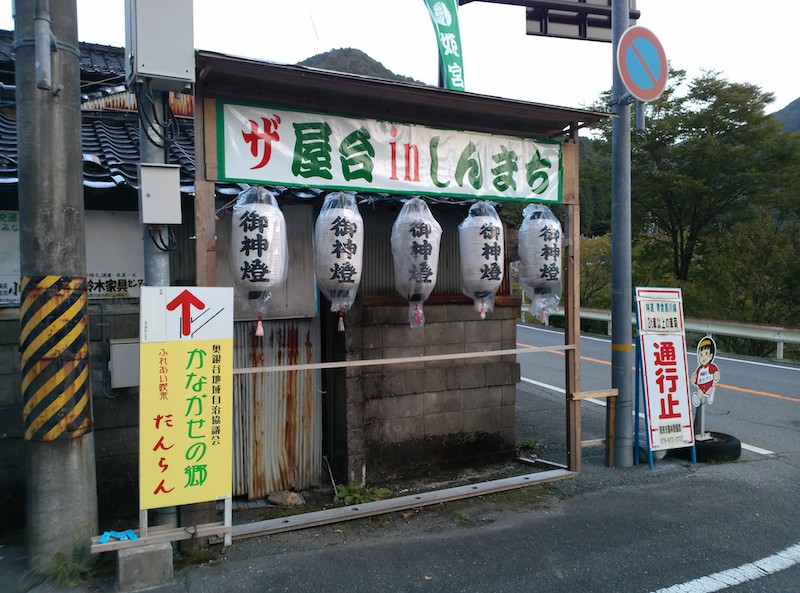Archive for Orthography
November 6, 2013 @ 1:09 am· Filed by Victor Mair under Orthography, Writing systems
As birth rates decline in many modernized countries around the world, it's interesting to think about what's driving that in each place, since the factors are never exactly the same.
In Japan, which is famous for having one of the lowest birthrates in the world (Germany has the lowest rate), a large part of it may be attributed to what is known as the "celibacy syndrome":
sekkusu shinai shōkōgun セックスしない症候群 (literally, "syndrome of not doing sex"; 39,100 ghits)
Read the rest of this entry »
Permalink
November 4, 2013 @ 10:22 am· Filed by Victor Mair under Humor, Orthography
From Perry Link, who recently delivered a lecture entitled "How Important is Internet Satire in China?" (October 29, 2013 [see below for abstract]) at Penn:
A note for the true-story joke section of your language log: My son and daughter-in-law were invited to my after-talk dinner at the Han Dynasty restaurant there on Market St. They googled the place for directions, not using spaces, and then thought: "Hey, wait a minute! Why are we going to a restaurant named the Handy Nasty?
Read the rest of this entry »
Permalink
October 30, 2013 @ 11:06 am· Filed by Victor Mair under Alphabets, Borrowing, Diglossia and digraphia, Found in translation, Language and advertising, Language and culture, Language and food, Multilingualism, Orthography, Pronunciation, Psychology of language, Slogans, Spelling, Transcription, Translation, Writing systems
Together with his "greetings from small-town Japan", Chris Pickel sent in this photograph of a sign, which was put up in his neighborhood for the aki-matsuri 秋祭り ("autumn festival").

Read the rest of this entry »
Permalink
October 24, 2013 @ 10:14 am· Filed by Mark Liberman under Orthography
Yasmine Seale discusses the (legendary and real) history of the Turkish alphabet: "Q v. K", LRB Blog, 10/16/2013. I was interested to learn that this version of Mustafa Kemal Atatürk's signature, actually designed by the Armenian calligrapher Hagop Çerçiyan, is "one of the most popular tattoos in Turkey":

There are some famous American signatures, but I've never seen any of them used as a tattoo.
Read the rest of this entry »
Permalink
September 25, 2013 @ 6:17 am· Filed by Victor Mair under Orthography, Pronunciation
Yesterday morning in class, I had all the students from China pronounce a word I wrote on the board — gē'ermen 哥儿们 ("pals; buddies; brothers") — and everybody was astonished to hear with their own ears the enormous differences in the way the word was pronounced, even though each student thought they were speaking standard Mandarin. This was not due to dialectal variation — because when I asked a few of the students to pronounce the word according to their home topolect, then it would come out in a quite different manner — but simply to individual differences in the realization of gē'ermen 哥儿们 in Mandarin.
Read the rest of this entry »
Permalink
August 17, 2013 @ 5:31 am· Filed by Geoffrey K. Pullum under Errors, Grammar, Ignorance of linguistics, Language and the media, Orthography, Spelling
Toxic grammar alert for Australians: Rodney Huddleston informs me that the ABC Radio breakfast show celebrated International Apostrophe Day on 16 August 2013 with disastrous results. Huddleston reports:
The presenter had brought in someone he called a grammar nerd/specialist and asked her about the use of the apostrophe. She managed to deal with dog's bowl and dogs' bowls, but when he asked her about children she said this was a collective noun, not a strictly plural and that in children's playgrounds and children's dreams the apostrophe should come AFTER the s.
I will not expose the grammar specialist's family to humiliation by naming her; I do have a heart. But this is really staggering misinformation. The apostrophe should never come after the s in cases of irregular pluralization. The genitive suffix is ’s unless the regular plural s immediately precedes it (in which case the genitive marker is simply the apostrophe alone). In irregular plurals like children, oxen, cacti, foci, phenomena, etc., there is no immediately preceding plural s, so the default holds: it's the children’s playgrounds, and likewise the cacti’s watering schedule, and these phenomena’s importance.
Beware of nonlinguists who appear on radio programs as grammar experts; they sometimes simply make stuff up.
Read the rest of this entry »
Permalink
June 20, 2013 @ 8:37 pm· Filed by Mark Liberman under Orthography
From Dick Margulis:
The first editor of the Encyclopædia Britannica, a Scot named William Smellie, was a distant relative to my wife, whose surname is Smillie, pronounced smiley (the spelling was changed at some point to avoid bad jokes, apparently). I believe William pronounced it smiley as well. John W. Willey (pronounced wily) was the first mayor of Cleveland (the brand new restaurant where my son is a sous chef is named The Willeyville because Willey bought a tract of land on the city's west side and named it that), and there are some towns in England named Willey, although I don't know that they share the same pronunciation. And a shibboleth here in New Haven is the pronunciation of Whalley Avenue, named for the English regicide Edward Whalley and pronounced whale-y, although Our Lady of the Google Navigator, who is Not From Around Here, rhymes it with alley.
I can't blame people who think my wife's name rhymes with Millie or the restaurant is the willie-ville, nor those who have trouble with Whalley, because the way we were all taught to decode a double-ell is that it makes the preceding vowel what we non-linguists call short. But as I find myself at the confluence of these three examples of this unusual (I think) orthographical feature, I'm just curious what the history of it is, if anyone at Language Log Plaza happens to know.
Read the rest of this entry »
Permalink
January 30, 2013 @ 1:34 pm· Filed by Mark Liberman under Orthography
On reddit.com/r/linguistics, someone recently posted the following query:
At the bottom of a letter written by one John England during the US Civil War (it is not by Bishop John England) is a paragraph in a script and (seemingly) language that I don't immediately recognize:

I think this is Irish Gaelic written in the old Gaelic script, but I'm really not sure. Anyone have any guesses?
I suspect that there are some LL readers who can do better than a guess.
Permalink
January 26, 2013 @ 10:12 am· Filed by Mark Liberman under Orthography
MDS wrote:
I have been frustrated in trying to figure out how to use verbal phrases consisting of a verb plus a preposition/adverb in an adjectival or noun context. I'm sure I didn't use the right linguistic phraseology there, so let me tell you what I mean. I'm speaking of verbal phrases such as "build out," "work out," "build up," "put in," "sell off," "sell out," etc., where the auxiliary word isn't really working as either an preposition or an adverb. It's simply part of a verbal phrase. When used as a verb, other words may either be placed in between the words of the verbal phrase or after it. E.g., "sell it off" vs. "sell off your stock." I would be interested to hear what the appropriate part of speech is for the auxiliary word in these verbal phrases.
That much is easy: out, up, in, off, etc. are all prepositions, and in the cited combinations with verbs, they are simply intransitive prepositions. But MDS continues:
However, that's not my main issue.
Read the rest of this entry »
Permalink
December 11, 2012 @ 7:10 am· Filed by Geoffrey K. Pullum under Orthography, This blogging life
Let me reveal to you a fiddly and rather strange detail about my latest piece on Lingua Franca, which concerns the misquotation "shaken but not stirred". In the post I crucially needed to quote a phrase from an obituary in The Economist where James Bond's favorite aperitif was mentioned. The Economist called it a Martini. But it is New York Times style to call the drink in question a martini, not a Martini, and The Chronicle of Higher Education follows New York Times style, and they own the Lingua Franca blog, and there are other occurrences of martini in my post. So a question arose between me and the editors of The Chronicle: whether to be accurate and quote the word as The Economist actually typeset it under their style, making it look as if I've been inconsistent within my post (because the Times-compliant occurrences in the text would look different), or to quote The Economist inaccurately by coercing them into Times style, making it look as if I can't even type stuff out from a magazine accurately. Talk about being between a rock and a hard place!
Read the rest of this entry »
Permalink
September 11, 2012 @ 1:46 pm· Filed by Geoffrey K. Pullum under ambiguity, Orthography, Syntax
"Grammar Fail!" wrote someone on Facebook beside a picture showing the printed words "Milk it for all it's worth." But Fiona Hanington pointed out to Language Log that it's not necessarily a fail. It's the wrong spelling if worth is the noun meaning "value", so the intended meaning was "Milk it for all the worth (= value) that it has." The genitive pronoun its is not spelled with an apostrophe; the right spelling would be Milk it for all its worth. However, there's another meaning, where worth is an adjective: it could be intended to mean "Milk it for all that it is worth." And there the apostrophe would be correct (indeed, required): Milk it for all it's worth. (English is loaded with little gotcha things of this sort, isn't it?) Since both mean roughly the same thing (they put it in different ways, but it's hard to imagine one of the meanings making a true claim where the other didn't), Fiona is right to note that this is one of the very rare cases where it's and its are both correct in the same context with the same meaning. You won't find many of those.
Read the rest of this entry »
Permalink
August 14, 2012 @ 11:09 pm· Filed by Victor Mair under Dictionaries, Language teaching and learning, Orthography, Transcription, Writing
Randy Alexander sent me the following photograph and asked how long it would take for me to identify the text in the background:

Read the rest of this entry »
Permalink
July 9, 2012 @ 11:24 am· Filed by Geoffrey K. Pullum under Errors, Orthography, Words words words
"Let's have lunch at that café — you know the one . . . Aquamarine," said my friend. And realized immediately, before even getting to the end of the word, that the café was not called anything like that. There is no Aquamarine café in Edinburgh. The one I rapidly guessed my friend was alluding to is a very nice Turkish place on Nicholson Street, and it's called Turquaz (their sign says "TurQuaz"). What the hell was going on with that crazy error? A random brainslip?
Read the rest of this entry »
Permalink



